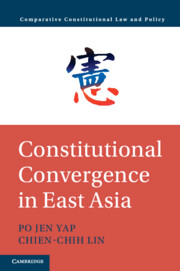In contrast with the decline of liberal constitutionalism around the world, liberal constitutionalism seems to be resilient in Taiwan. Weaving together several threads of history, law and politics, this article first argues that foreign legal education and identity concerns explain why judicial review and constitutional development more broadly in Taiwan have not only flourished but mirrored both German and American constitutional jurisprudence. Second, it maintains that the case of Taiwan poses another challenge to the concept of global constitutionalism since the number of referenced jurisdictions is quite limited.
